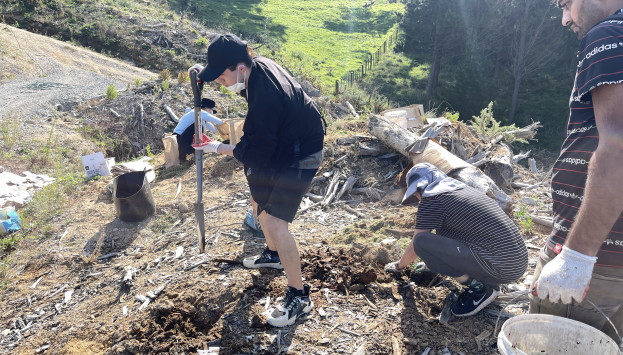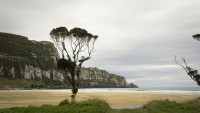A group of volunteers from the Green Office Toitū at OPAIC had a memorable time contributing to reforestation efforts in Waihi this month.
Volunteer, Hallie Duong, says the Aureate Reforestation project is all about planting trees to help save the Earth from climate change and biodiversity loss, as well as contributing to saving the environment.
“We all had an unforgettable experience with the Aureate Reforestation project,” she says.
Hallie says the landowners had a vision of replacing the pine on their 25-hectare property with an entirely native forest that provides a home for native birds and creates a permanent carbon sink. They commenced reforestation on a large scale in April 2020.
Her group of volunteers planted 28 kākābeak, 21 harakeke, and 33 akeake plants and all really enjoyed the work.
Hallie says there are many benefits to restoring and conserving critical forests.
“Replanting native forest is the best way to remove carbon and support biodiversity and the natural environment.”
It helps to provide clean air, enhance water quality, create homes for thousands of species of plants and animals, and regenerate vegetative links and chains, she says.
Volunteer Yujie Shao’s role in the project involved cutting wilding conifers. This could be done by uprooting the wilding pine by hand to completely eradicate it or by using pliers to cut off the bottom trunk to slow the growth.
Yujie says planted in the right places, introduced conifers such as pines and firs can provide wood, store carbon, reduce erosion, filter soil nutrients and improve water quality, and provide shade for stock.
In the wrong places, these conifers pose a major threat to New Zealand's ecosystems, land, and farms.
Controlling the spread of wild conifers is important if we are to protect our ecosystems, he says.
Volunteer project manager and student, Joanna Wang, says she was excited to be able to acquire knowledge of the Emissions Trading Scheme and contribute to growing native forests, through her role.
She says she strongly relates to Otago Polytechnic’s vision – “Our people make a better world - Kia tū ki te tahi”.
Joanna says that in future the Green Office Toitū plans to hold monthly volunteer event where participants will tour and visit Waihi on the first day, and then put in the work of planting trees on the second day.
“Reforestation must be an ongoing effort, and the students' hands-on participation in Aureate Reforestation's volunteer project allows them to learn not only about planting and maintaining trees, but also gain knowledge about native plants,” she says.
Green Office Toitū coordinator Dani Mao says planted native trees will store carbon at a growing pace as they age and enhance natural landscapes, indigenous biodiversity, and cultural values.
“Green Office Toitū proudly partners with Aureate Reforestation with the vision of creating an entirely native forest that provides a home for native birds and a permanent carbon sink,” she says.
Their reforestation project is situated in the Coromandel Pōhutakawa Ecological zone, moving into the Pūriri zone at its furthest from the sea, and their replanting is consistent with these guidelines.
“Our students will learn about native Reforestation, ecosourcing seeds, raising seedlings, birdlife, native plants identification through this project. This project also enables students to acquire knowledge of te reo Māori and tikanga Māori,” says Dani.
Published on 14 Apr 2022
Orderdate: 14 Apr 2022
Expiry: 14 Apr 2024






